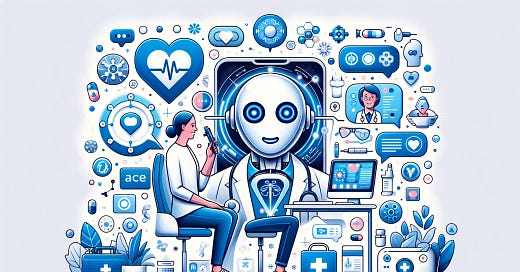Next-Gen Diagnostics: AI Conversations in Healthcare
Introducing AMIE: Pioneering Diagnostic Dialogues with AI for Enhanced Patient Care
Introduction
In the rapidly evolving landscape of healthcare, artificial intelligence (AI) emerges as a beacon of innovation, promising to redefine the traditional paradigms of patient care and diagnosis. At the forefront of this revolution is AMIE (Articulate Medical Intelligence Explorer), a groundbreaking Large Language Model (LLM) optimized for diagnostic dialogue, ushering in a new era of conversational AI in medicine.
The Breakthrough of AMIE
Developed with the precision of capturing the nuanced physician-patient dialogue, AMIE is designed to mimic the critical process of history-taking that is fundamental to accurate diagnosis and effective treatment. This AI system leverages advanced algorithms to interact with patients, gather medical history, and suggest diagnoses, all while ensuring a level of empathy and understanding that resonates with the human touch.
Enhancing Accessibility and Quality of Care
AMIE's implementation could significantly increase healthcare accessibility, providing consistent and high-quality diagnostic consultations across diverse geographical and socio-economic landscapes. By automating the initial stages of diagnosis, AMIE has the potential to alleviate the burden on healthcare systems, streamline patient management, and expedite the delivery of care.
A Comparative Milestone
In a landmark study comparing AMIE's performance to that of primary care physicians (PCPs), this AI system not only demonstrated superior diagnostic accuracy but also excelled across multiple dimensions of patient interaction. Evaluated in a randomized, double-blind crossover study involving text-based consultations with patient actors, AMIE's capabilities were put to the test, revealing its proficiency over traditional diagnostic methods.
Future Directions and Considerations
While AMIE represents a significant advancement in medical AI, its deployment in real-world settings necessitates thorough validation, ethical considerations, and integration into existing healthcare frameworks. The journey towards implementing conversational diagnostic AI involves addressing privacy concerns, ensuring cultural competence, and maintaining the irreplaceable value of human empathy in patient care.
Conclusion
The advent of conversational diagnostic AI, exemplified by AMIE, marks a pivotal moment in healthcare technology. As we stand on the cusp of a new frontier in medical diagnostics, the promise of AI to transform patient care is not just a vision of the future—it's a rapidly approaching reality. With continued research, ethical oversight, and collaborative innovation, conversational AI has the potential to enrich the healthcare experience, making it more accessible, efficient, and patient-centered than ever before.
For those intrigued by the blend of technology and healthcare, the journey of AMIE and conversational diagnostic AI is just beginning, promising a world where every patient interaction is informed, empathetic, and tailored to the unique needs of the individual.
Please consider showing your support by sharing this post with your friends and colleagues.




